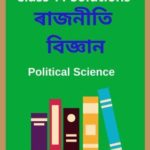Class 11 Political Science MCQ Chapter 7 Federalism Solutions to each chapter is provided in the list so that you can easily browse through different chapters Class 11 Political Science MCQ Chapter 7 Federalism Notes and select need one. Class 11 Political Science MCQ Chapter 7 Federalism Question Answers Download PDF. NCERT Political Science MCQ Class 11 Solutions.
Class 11 Political Science MCQ Chapter 7 Federalism
Also, you can read the NCERT book online in these sections Solutions by Expert Teachers as per Central Board of Secondary Education (CBSE) Book guidelines. AHSEC Class 11 Political Science Part – I and Part – II MCQ Solutions are part of All Subject Solutions. Here we have given NCERT Class 11 Political Science Multiple Choice Notes, Assam Board Class 11 Political Science Objective Type Solutions for All Chapters, You can practice these here.
Federalism
Chapter: 7
| (PART-A) INDIAN CONSTITUTION AT WORK |
| MCQ |
1. What was one of the major reasons for the breakup of the USSR?
(a) The domination of Uzbekistan over other regions.
(b) The excessive decentralisation and lack of power.
(c) The domination of Russia over other regions.
(d) The lack of cultural diversity in the country.
Ans: (c) The domination of Russia over other regions.
2. Federalism stands for:
(a) Decentralisation of powers.
(b) Sharing of powers.
(c) Separation of powers.
(d) Centralisation of powers.
Ans: (a) Decentralisation of powers.
3. How many major languages are spoken in India?
(a) More than 20
(b) More than 50
(c) More than 10
(d) More than 22
Ans: (d) More than 22
4. Which one of the following is not a features of the Indian federation?
(a) Distribution of powers.
(b) Dual citizenship.
(c) Written constitution.
(d) Supremacy of the constitution.
Ans: (b) Dual citizenship.
5. What are the important factors of federalism?
(a) Adopting a federal constitution.
(b) The nature of that federal system.
(c) The practice of federalism.
(d) All of these.
Ans: (d) All of these.
6. Which one of the following is not in the Union List?
(a) Defence.
(b) Railways.
(c) Foreign Affairs.
(d) Forests.
Ans: (d) Forests.
7. Which one of the following articles declares India a ‘Union of States?
(a) Article 1
(b) Article 2
(c) Article 10
(d) Article 6
Ans: (a) Article 1
8. Guardian of Indian federation is:
(a) The Parliament.
(b) The Supreme Court.
(c) The President.
(d) Political Parties.
Ans: (b) The Supreme Court.
9. In India, Residuary Powers are with the:
(a) Union Territory.
(b) Governor.
(c) Centre.
(d) State Government.
Ans: (c) Centre.
10. Residuary powers are vested with:
(a) Executive.
(b) Parliament.
(c) Judiciary.
(d) Local Government.
Ans: (b) Parliament.
11. Which of the following helps federations to function smoothly?
(a) Domination of a single unit.
(b) Culture of mistrust.
(c) Cooperation, mutual respect and restraint.
(d) Absence of independent judiciary.
Ans: (c) Cooperation, mutual respect and restraint.
12. In 1950s the foundation of our federalism was laid under:
(a) Gandhiji.
(b) Pt. Nehru Ji.
(c) B.R.Ambedkar.
(d) None of these.
Ans: (c) B.R.Ambedkar.
13. Which Article gives special status to Jammu & Kashmir?
(a) Article 270
(b) Article 170
(c) Article 370
(d) Article 340
Ans: (c) Article 370
14. The first country where federation was established is:
(a) Switzerland.
(b) U.K.
(c) Canada.
(d) U.S.A.
Ans: (d) U.S.A.
15. We have taken the idea of Union of States from:
(a) Canada.
(b) U.K.
(c) Switzerland.
(d) U.S.A.
Ans: (a) Canada.

Hi! my Name is Parimal Roy. I have completed my Bachelor’s degree in Philosophy (B.A.) from Silapathar General College. Currently, I am working as an HR Manager at Dev Library. It is a website that provides study materials for students from Class 3 to 12, including SCERT and NCERT notes. It also offers resources for BA, B.Com, B.Sc, and Computer Science, along with postgraduate notes. Besides study materials, the website has novels, eBooks, health and finance articles, biographies, quotes, and more.



